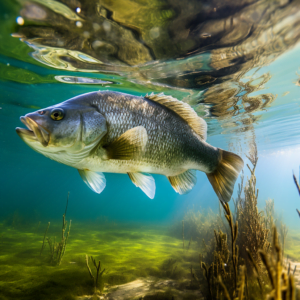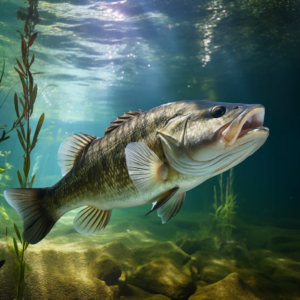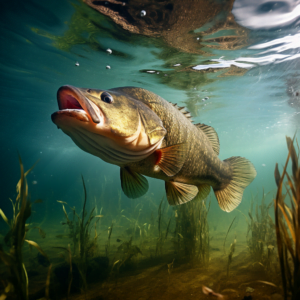When it comes to choosing fish as a part of your diet, there are countless options to consider. And one fish that often comes up in discussions is black bass. But is black bass really a healthy choice? In this article, we will take a closer look at the nutritional benefits and potential risks associated with consuming black bass, so that you can make an informed decision about whether or not to include it in your diet.
Firstly, let’s talk about the nutritional benefits of black bass. Black bass is a type of fish that is rich in omega-3 fatty acids, which are essential for the proper functioning of our bodies. These fatty acids have been shown to have numerous health benefits, such as reducing inflammation, improving heart health, and supporting brain function. In addition to omega-3 fatty acids, black bass is also a good source of protein, which is vital for muscle growth and repair.
However, it’s important to note that there are also potential risks associated with consuming black bass. One such risk is the presence of mercury in the fish. Mercury is a toxic substance that can accumulate in fish and have adverse effects on human health, particularly when consumed in large quantities. It is therefore recommended to limit the consumption of black bass, especially for pregnant women, nursing mothers, and young children, who may be more susceptible to the harmful effects of mercury.
In conclusion, black bass can be a healthy choice due to its high content of omega-3 fatty acids and protein. However, it is important to be aware of the potential risks associated with consuming black bass, particularly the presence of mercury. By understanding the nutritional benefits and potential risks of black bass, you can make an informed decision about whether or not to include it in your diet. In the next sections of this article, we will further explore the nutritional profile of black bass and provide some tips on how to safely consume this fish. A Closer Look at the Nutritional Benefits and Potential Risks
Overview of Black Bass
What is Black Bass?
Black Bass refers to a group of freshwater fish species that are highly valued both for recreational fishing and as a food source. They are known for their excellent taste and culinary versatility. The most common species of black bass include Largemouth Bass, Smallmouth Bass, Spotted Bass, and Guadalupe Bass.
Types of Black Bass
Largemouth Bass (Micropterus salmoides) is the most popular and widely distributed species of black bass. It is known for its distinctive “largemouth” and can be found in lakes, rivers, and ponds across North America. Smallmouth Bass (Micropterus dolomieu) is another popular species, known for its aggressive nature and acrobatic fights. Spotted Bass (Micropterus punctulatus) is similar in appearance to largemouth bass but has a smaller mouth and a distinct row of spots along its sides. Guadalupe Bass (Micropterus treculii) is native to Texas and is known for its vibrant colors and adaptability to a variety of habitats.
Physical Characteristics of Black Bass
Black bass are known for their sleek, streamlined bodies, which allow them to move through the water quickly and efficiently. They have a distinctive appearance with a large mouth, sharp teeth, and a dorsal fin that is divided into two sections – a spiny section and a soft section. Black bass typically have a dark green color on their backs with lighter colors on their sides and belly. The average size of black bass varies depending on the species, with largemouth bass being the largest, reaching lengths of up to 29 inches and weighing over 20 pounds.
Nutritional Benefits of Black Bass
Protein Content in Black Bass
Black bass is a highly nutritious fish that is rich in protein. Protein is an essential nutrient that plays a crucial role in building and repairing tissues, supporting immune function, and maintaining overall health. A 100-gram serving of black bass provides approximately 20 grams of protein, making it an excellent source of high-quality protein for individuals of all ages.
Omega-3 Fatty Acids in Black Bass
One of the key nutritional benefits of black bass is its high omega-3 fatty acid content. Omega-3 fatty acids are a type of polyunsaturated fat that has been linked to numerous health benefits, including reduced inflammation, improved heart health, and enhanced brain function. Black bass, especially those caught in cold-water environments, are known to contain high levels of omega-3 fatty acids, including eicosapentaenoic acid (EPA) and docosahexaenoic acid (DHA).
Vitamins and Minerals in Black Bass
Black bass is also a good source of vitamins and minerals that are essential for maintaining optimal health. It is rich in vitamins B12 and D, as well as minerals such as selenium, phosphorus, and potassium. Vitamin B12 is necessary for the formation of red blood cells and proper functioning of the nervous system, while vitamin D is important for bone health and immune function. Selenium is a powerful antioxidant that helps protect cells from damage, and phosphorus and potassium play vital roles in maintaining healthy bones, muscles, and organs.
Potential Risks of Consuming Black Bass
Mercury Levels in Black Bass
One potential risk associated with consuming black bass is its potential for mercury contamination. Mercury is a naturally occurring heavy metal that can be found in varying amounts in fish and seafood. Larger fish, such as black bass, tend to accumulate higher levels of mercury in their bodies compared to smaller fish. High levels of mercury can be harmful, especially to pregnant women, breastfeeding mothers, and young children. It is recommended to limit consumption of black bass and other fish known to have high mercury levels to ensure optimal health.
Possible Health Concerns
While black bass is generally considered safe to eat, there are a few health concerns to be aware of. Some people may be allergic to fish, including black bass, and may experience symptoms such as hives, swelling, or difficulty breathing after consuming it. Additionally, improperly cooked black bass or cross-contamination during preparation can lead to foodborne illnesses caused by bacteria or parasites. It is important to cook black bass thoroughly and follow proper food safety practices to minimize the risk of illness.
Recommendations for Consumption
To minimize potential risks and maximize the nutritional benefits of black bass, it is recommended to consume it in moderation and follow certain guidelines. Pregnant women, breastfeeding mothers, and young children should limit their consumption of black bass and other fish high in mercury. It is also important to choose fish that are sourced from reputable suppliers and are known to be sustainably caught or farmed. Additionally, proper cooking methods should be followed to ensure the fish is safe to eat.
Black Bass in a Healthy Diet
Incorporating Black Bass in Balanced Meals
Black bass can be a delicious and nutritious addition to a balanced diet. It can be prepared in various ways, including grilling, baking, and pan-frying, and can be enjoyed as a main course or added to salads, pasta dishes, or tacos. Pairing black bass with vegetables, whole grains, and healthy fats can create a well-rounded meal that is both satisfying and nutritious.
Health Benefits of Including Black Bass in Diet
Including black bass in your diet can provide numerous health benefits. Its high protein content can help support muscle growth and repair, while its omega-3 fatty acids promote heart health and brain function. Black bass is also low in saturated fat and calories, making it a healthier choice compared to some other protein sources. Additionally, its rich vitamin and mineral content contribute to overall health and wellbeing.
Comparisons with Other Fish Options
When it comes to choosing fish for a healthy diet, black bass can be a great option. Its nutritional profile is comparable to other popular fish such as salmon, trout, and tuna. However, it is important to consider individual dietary needs and preferences when selecting fish. Some fish may be higher in certain nutrients, while others may have a different flavor or texture. It is recommended to include a variety of fish in the diet to obtain a wide range of nutrients.
Sustainable Fishing Practices for Black Bass
Conservation Efforts for Black Bass
The conservation of black bass populations and their habitats is essential for their long-term sustainability. Conservation efforts include managing fishing regulations, protecting spawning areas, and promoting habitat restoration. These initiatives help maintain healthy populations of black bass, allowing for sustainable fishing practices and ensuring their availability for future generations.
Regulations and Fishing Techniques
Fishing regulations for black bass vary depending on the location and species. It is important for anglers and consumers to be aware of and comply with local fishing regulations to prevent overfishing and preserve the integrity of black bass populations. Additionally, sustainable fishing techniques such as catch-and-release can help reduce the impact on black bass populations and ensure their long-term survival.
Certification Programs for Sustainable Black Bass
In recent years, certification programs for sustainable fishing practices have emerged, providing consumers with reassurance that the fish they purchase has been sourced responsibly. Programs such as the Marine Stewardship Council (MSC) and the Aquaculture Stewardship Council (ASC) certify black bass and other fish species based on strict criteria for environmental sustainability, social responsibility, and traceability. These certifications can help consumers make informed choices and support sustainable fishing practices.
Black Bass Cooking Tips
Selecting and Storing Fresh Black Bass
When selecting fresh black bass, look for firm, bright, and moist flesh. The eyes should be clear, and the gills should be bright red or pink. Avoid fish with a strong “fishy” odor, as it may indicate that the fish is not fresh. To store black bass, wrap it tightly in plastic wrap and place it in the coldest part of your refrigerator. Fresh black bass can be stored for up to two days before cooking.
Popular Recipes and Cooking Methods
Black bass can be cooked in a variety of ways, depending on personal preference. Grilling is a popular method that enhances the natural flavors of the fish. Baking the fish in the oven with herbs and spices is another delicious option. Pan-frying black bass can create a crispy exterior while keeping the flesh moist and flaky. Black bass can also be used in recipes such as blackened fish tacos, fish chowder, or grilled fish salads.
Tips for Grilling, Baking, and Pan-Frying Black Bass
When grilling black bass, preheat the grill to medium-high heat and lightly oil the grates to prevent sticking. Season the fish with salt, pepper, and your favorite herbs or marinade. Place the fish on the grill and cook for about 4-5 minutes per side, or until the flesh is opaque and flakes easily with a fork. For baking, preheat the oven to 375°F (190°C) and place the seasoned fish on a baking sheet lined with parchment paper. Bake for approximately 10-12 minutes, or until the fish is cooked through. When pan-frying black bass, heat oil in a non-stick skillet over medium-high heat. Season the fish and place it in the skillet, cooking for about 3-4 minutes per side until golden brown and cooked through.
Black Bass and Culinary Diversity
Regional and International Black Bass Cuisine
Black bass is enjoyed in various regional and international cuisines, showcasing its versatility and adaptability in different dishes. In the United States, black bass is a popular choice for Southern-style fish fries and is often prepared with cornmeal breading. In Asian cuisine, black bass is commonly used in dishes such as whole steamed fish with soy sauce and ginger. Black bass is also featured in Mediterranean cuisine, where it is often roasted with olive oil, lemon, and fresh herbs.
Fusion Dishes and Unique Preparations
As culinary boundaries continue to be pushed, black bass is being incorporated into fusion dishes and unique preparations. It can be found in dishes such as black bass ceviche, black bass sushi rolls, and black bass tacos with exotic toppings. The mild and delicate flavor of black bass lends itself well to various flavor profiles, making it a versatile ingredient in creative and innovative recipes.
Black Bass as a Gourmet Ingredient
Black bass is highly regarded as a gourmet ingredient in fine dining establishments. Its tender flesh, subtle flavor, and versatility make it an excellent choice for chefs looking to create elegant and sophisticated dishes. Black bass can be prepared using advanced cooking techniques such as sous vide or served as a delicate sashimi-style dish. Its aesthetic appeal and culinary versatility make it a sought-after ingredient for culinary enthusiasts and food connoisseurs.
Other Health Benefits of Black Bass
Black Bass and Heart Health
The omega-3 fatty acids found in black bass have been linked to improved heart health. These fatty acids can help reduce inflammation, decrease triglyceride levels, and improve cholesterol profiles. Consuming black bass as part of a heart-healthy diet can contribute to a lower risk of heart disease and promote cardiovascular well-being.
Impact on Cognitive Function
Omega-3 fatty acids, particularly DHA, have been shown to have a positive impact on cognitive function. They play a crucial role in the development and maintenance of the brain and can help enhance memory, focus, and overall cognitive performance. Including black bass in your diet can provide a natural source of these beneficial fatty acids that support brain health.
Immune System Benefits
Black bass contains vitamins and minerals that support a healthy immune system. The combination of vitamins B12, D, selenium, and other essential nutrients helps strengthen the immune response and enhance the body’s natural defense mechanisms. Consuming black bass as part of a balanced diet can help support overall immune system function and promote optimal health.
Black Bass in Aquaculture
Black Bass Farming Methods
As the demand for black bass continues to rise, aquaculture practices have been developed to meet this demand. Black bass can be farmed in carefully controlled environments, where water quality, diet, and growth conditions can be optimized. Farm-raised black bass is often considered a sustainable and environmentally friendly alternative to wild-caught black bass, as it reduces pressure on wild populations and allows for consistent supply and quality.
Environmental Impact and Sustainability
Sustainable aquaculture practices have been implemented to minimize the environmental impact of black bass farming. These practices include using recirculating aquaculture systems to minimize water usage and waste, selecting sustainable sources of fish feed, and implementing monitoring programs to ensure compliance with environmental regulations. When choosing farmed black bass, look for certifications such as the ASC logo to ensure that it has been produced using environmentally sustainable methods.
Comparison with Wild-Caught Black Bass
While both wild-caught and farmed black bass can be enjoyed as part of a healthy diet, there are some differences to consider. Wild-caught black bass is a product of natural ecosystems and is known for its unique flavor profiles and textures. However, the availability of wild-caught black bass can vary depending on fishing seasons and regulations. Farm-raised black bass, on the other hand, offers consistent availability throughout the year and can be more readily accessible. Additionally, the environmental impact of wild-caught black bass can be more challenging to regulate compared to carefully managed aquaculture systems.
Conclusion
Summary of the Nutritional Benefits
Black bass is a highly nutritious fish that offers numerous health benefits. It is a rich source of protein, omega-3 fatty acids, vitamins, and minerals that are essential for maintaining optimal health. Including black bass in a balanced diet can contribute to muscle growth, heart health, brain function, and immune system support.
Awareness of Potential Risks
While black bass is generally safe to eat, it is important to be aware of potential risks associated with consumption. Mercury contamination can be a concern, especially for vulnerable populations such as pregnant women and young children. Proper cooking and storage methods should also be followed to prevent foodborne illnesses. Being mindful of these risks and following recommended guidelines can help ensure a safe and enjoyable dining experience.
Appreciating Black Bass as a Healthy Food Option
Black bass’s unique taste, nutritional profile, and culinary versatility make it a healthy food option that can be enjoyed in a variety of delicious dishes. Whether it is enjoyed in traditional recipes, fusion cuisine, or gourmet preparations, black bass offers a combination of health benefits and gastronomic satisfaction. By incorporating black bass into your diet and supporting sustainable fishing practices, you can enjoy its flavors while contributing to the protection and conservation of this remarkable fish species.




